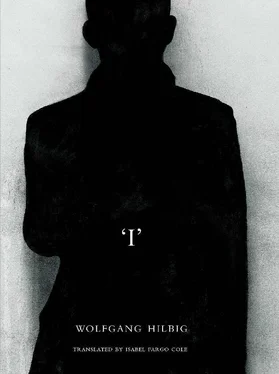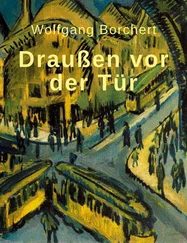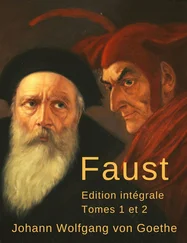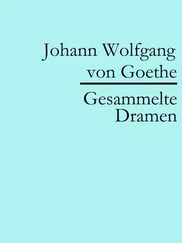Frau Falbe came the next evening; he gave a start as the door was suddenly unlocked. — You’re sitting in the dark? she said in surprise, and switched the light on. Are you sitting in the dark on purpose? — He felt foolish; since the evening before he’d neither bathed nor dressed, his discarded clothes still lay in a pile on the floor behind the rumpled cot, he was still wearing the badly fitting, not very clean pyjamas whose fly wouldn’t stay closed due to the frayed buttonholes, so that his hand always hovered warily nearby. But that wasn’t the worst of it; he’d spent a depressive night, too lazy even to go to the pub, sleeping just a few hours at intervals in the armchair, and every time he woke up he’d sensed vividly that the intangible beast still lingered in the room. Feuerbach had reached for him from afar and dragged him back inexorably. He recalled that if he’d any reason to think the first lieutenant was in the city, he would have set out in search of him!
The evening with Frau Falbe turned into a debacle; from a certain moment onward he’d positively dreaded having to get his sexual energies flowing for her. . he was glad that all she seemed to want to do was chat, but even then he wasn’t really listening. — At one point he had the idea of suddenly telling her everything (deconspiring, that would have been the technical term). . he scrapped the idea at once, otherwise Frau Falbe would immediately have seen him as one of the people who had gone at her protégé Harry with the gun. . when what he really wanted to do was share her disgust at the story, and at some point, he hadn’t yet abandoned the thought, have her play the game of the fantasy of the thing with the gun. . Today you keep looking at me like you’ve seen a ghost, she said at one point, I think I have come at a bad time. . After a while she’d suggested that he come and watch a movie on TV. It’s a James Bond movie, she said, Harry always liked those. — A movie. . he said, I don’t think that whole espionage thing is much fun in real life. Incidentally, he’d liked that thing yesterday noon much better, unfortunately it had gone a bit quickly. . — She didn’t give the impression of concurring with his words, it seemed more that the memory embarrassed her. But she did leave him with a glimmer of hope; already at the door, she turned around again and said: Yes, me too of course. .
And then she stuck her head back in: By the way, I had a visitor last night. . You can guess who it was. . — He’d almost asked if it had been Feuerbach. — He asked for Harry. There’s someone in the room again, he said, so Harry Falbe must be back. Falbe , he said. . didn’t you also think Harry has the same name as me? — What did you tell him? asked W. — I said, Harry Falbe, I don’t know the man, I don’t have any relatives. All I’ve got is my husband, and he’s somewhere in the West, and he works for the State! — Was it the same guy again, you know, the one with the gun? — No, she said, a different one, I never saw him before. And then he asked about you. In a roundabout way, who’s living downstairs now, he asked. . I said, that’s none of your business, you’re not getting any information from me. — What did he look like? Didn’t he say who sent him? — It was a tall guy, more than tall, I thought, good Lord, the guy’s over six foot. And you could tell from his voice that he’s not from Berlin, he talked the way you do.
About the name, W. explained, that just slipped out. I really thought Harry was a relative of yours. Maybe we’re not even talking about the same. . maybe you have a photo of him somewhere?
She shrugged her shoulders; W. said he wasn’t feeling so well today, he’d have to take a walk now. . And maybe we’ll see each other tomorrow. .
OK, she said, but not noon again already! — And it sounded as though she had felt flattered by W.’s obdurate desire.
His only option for the rest of the evening was to have a bite to eat in one of the neighbourhood restaurants. He knew of a tiny pub that served fried herring with fried potatoes, an exclusive rarity that constituted one of the advantages of the capital, and there he headed. He even managed to find a seat. First, with his back to the door, he sat across from a mirror that hung at a tilt on the upper part of the wall. He barely recognized himself in it; he had to hunt for himself among all the people at the table, strangely anonymous in their volubility. . and the mirror reflected only the lower part of the door, which kept opening and admitting new guests; it was impossible to identify who came in, and he had the growing fear that at any moment he would feel the tap of a very familiar finger on his shoulder. . or at any moment see a tall figure in the mirror, so tall that it lacked head and legs. At last a chair freed up across from him; he changed places, and now had time to think.
Before leaving the room he had cleared off the desk, stowing his papers in the empty drawers and leaving only a few white, clean sheets on the desktop. Intolerable, to return and have the first thing he saw be scribbled scraps of paper, phrases typed through a faded ribbon that were summonses to meet-ups, on their backs barely legible notes along the lines of the game of the fantasy of the thing with the gun . . the fantasy of the woman ’ s game with the thing of the gun . . the story of the woman ’ s fantasy of the game of the thing with the gun . . and so on. . the structure of the genitive of the genitives — that ought well to seem familiar!
He was sick of his work, it was second rate, Feuerbach was absolutely right about that. The work was mediocre. . if only it had been bad, the media would have lapped it up. But the media. . especially the Western media!. . loved mediocrity. . the measure of mediocrity was the medium of the press of oppression. .
His work was some second persona’s occupational therapy, or the products of a neurotic who with an enormous effort transformed himself for a few minutes a day into a writer. . or transformed himself back, perhaps, it being possible that in this person’s second, already half-forgotten persona there had once been the makings of a writer. Now nothing but a sentimental hope made him cling to these makings. . some drivel about artistic gifts bore the blame for this hope, and that drivel came from his case officer. It had ultimately gotten to the point at which recalling his so-called talent cost him a nervous strain alleviable only by immediate sleep. . and each time he woke up he was relieved to find that he was still the same old person: Feuerbach’s best man. . Go ahead, pat yourself on the back! said his superior. — And then, once again, he was that guy who gadded about bored but secretly attentive, who answered to a code name. Or didn’t answer, depending, or answered to this other name which he had to use to sign things and which appeared above his published poems. . above his first poem to be published, illegally in the Western press half a year ago, a year ago or a year and a half ago, and then above the next poem too, and he’d kept this name ever since then (and ever since then a character of this name appeared regularly in his reports. .)
And often enough he didn’t even react when he heard the name that stemmed from the so-called author bios of scattered poetry publications, garlanded by completely incoherent and legendary data about a person who was a pure fiction. And he could never say offhand whether or not this data was correct. . once, he recalled, he had been turned away from one of the offices in the city because he wasn’t clear on his current data. It was one of those identical, completely anonymous offices (the door sported a private, random name, furnished, as so often, with a spillage of consonants, the more consonants, the more expensive the flat behind the door: Pr Dr Dr h.c. E. Schulze-Lehmann, or perhaps something even more original); and there was actually — he didn’t know when she’d come in — a receptionist; when asked for some year from his legend. . either a birth or a death date. . he’d replied: Ask the boss and have him check the filing card.
Читать дальше












